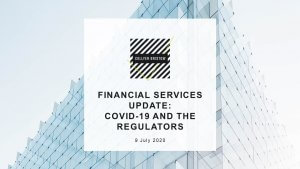- Banking & financial disputes

Longer Reads
What the FCA’s business interruption case means for your business
Small businesses have been thrown a lifeline as a result of the judgement on 15 September 2020 in the business interruption insurance test case, where the High Court ruled that some insureds will be covered for losses caused by the impacts of the Covid-19 pandemic. We outline what the test case could mean for your business.
5 minute read
Published 22 October 2020
Key information
- Specialisms
- Dispute Resolution
- Business
- Services
- Banking & financial disputes
In June 2020, the Financial Conduct Authority initiated a claim against eight defendant insurers, seeking to answer the question of whether business interruption losses caused by the Covid-19 pandemic are covered under certain insurance policies.
The regulator adopted an impressive and highly adversarial approach, fighting tooth and nail for the interests of affected policyholders, many of whom are small to medium sized enterprises.
Who will be impacted?
The test case considered 21 “lead policies” issued by the defendant insurers. However, any business owner with some form of BII policy will be interested in the outcome, as the lead policy wordings were only a representative sample of what was available in the market. The Court’s ruling recently will be of much wider application, as it delivered persuasive guidance for the interpretation of similar policy wordings.
In fact, it has been estimated that over 370,000 businesses could be impacted and the regulator has instructed insurers to apply the judgment in reassessing all outstanding or previously rejected claims.
The lead policies essentially fell into three categories:
1. what the FCA termed “disease clauses”;
2. what have been referred to as “hybrid clauses”;
and 3. clauses covering prevention or denial of access.
Disease clauses
In broad terms, disease clauses provide coverage for business interruptions caused by the occurrence of a notifiable disease nearby to the insured business premises.
Although each disease clause considered by the Court was cast in slightly different terms, in all cases the trigger for cover was that Covid-19 must have occurred within a specific radius of the business premises (for example 25 miles).
The Court held that there will have been an occurrence of Covid-19 within any geographical area when at least one person infected with the virus was within its boundaries, triggering the relevant disease clause from that point in time.
The upshot is that most insureds with disease clause cover will be entitled to receive payment, assuming they can prove that Covid-19 occurred within the geographical area specified under their policy.
What losses will be recoverable?
The insurers sought to argue that the presence of Covid-19 was not itself the only (or even the predominant) cause of the losses that many businesses have suffered since the lockdown began in March 2020.
Losses arising from a general reduction in consumer demand and the government’s various lockdown measures were said to be distinguishable and therefore not covered. However, the Court disagreed, ruling that all those consequences resulted from the same composite cause: namely, the occurrence of Covid-19.
With very limited exceptions, most insureds will therefore be able to claim up to the allowable monetary limited under their policy for any business interruption which the insured can show resulted from Covid-19, including by reason of the actions, measures and advice of the government, and the reaction of the public in response to the disease, from the date when the disease occurred in their relevant geographical area.
How can an insured prove the presence of Covid-19?
One issue that remains somewhat live is the question of how policyholders with disease clauses can prove that Covid-19 was present in the area required by their policy. The Court was unable to officially sanction any particular methodology, so insurers will have to consider this issue on a claim-by-claim basis.
Insurers did at least concede that certain forms of evidence could (in principle) be used to discharge an insured’s burden of proof. Examples of such evidence would include reported cases of the virus in a particular location, death statistics published by the NHS, or publicly available data published by the Office of National Statistics.
Policyholders could therefore, for example, seek to prove the presence of Covid-19 in their policy area if NHS data shows that a Covid-19 related death occurred at hospital situated within that area.
Exclusion clauses?
Confusingly, some insurance policies that contain a disease clause, may at first sight appear to also exclude any losses resulting from “disease and epidemic”. This was the case with one particular lead policy considered in the test case. However, the Court held that such contradictory general exclusions will not override an express grant of cover and accordingly that insurers cannot rely on them to deny payment.
Prevention of access clauses
The test case then considered “prevention of access” clauses. In broad terms, these clauses provide cover where there has been business interruption resulting from:
1. prevention or hindrance of access to the insured premises,
2. due to the actions, order or advice of a government or local authority,
3. due to an emergency or incident that is likely to endanger life.
Although this is the area where policy wordings vary most significantly, the court identified some common themes that will assist in interpreting prevention of access clauses across the board.
Was there prevention or hindrance of access?
In order to trigger a policy that requires “prevention”, the Court held that there must have been a complete closure of the premises. This does not mean that access must have been physically prevented.
However, the underlying government action or advice must have required complete (as opposed to partial) closure of a premises for the purpose of conducting the insured’s main business. This is to be contrasted with the concept of “hindering” access, which might only make conducting business more difficult, but not impossible.
Take for example a pub or restaurant that was obliged to close because of the government’s Covid-19 regulations. If they then commenced a new takeaway service during lockdown, there would still be prevention of access because the new service involved a fundamental change to the insured’s business.
Alternatively, where a pub or restaurant already had a substantial takeaway service in place before lockdown, the government direction to cease in-house dining would not have “prevented” access, as the policyholder could still carry on that part of its existing business.
What government restrictions will trigger the clause?
In order to “prevent” access, the underlying government action or restrictions imposed on the public must have held the force of law.
The government’s advice to stay at home, stop non-essential contact and unnecessary travel, were not categorised as legally enforceable, mandatory instructions. As such, while this advice could perhaps be said to have “hindered” businesses, only the government regulations passed on 21 and 26 March 2020, which required certain businesses to shut down, will trigger cover for “prevention” of access.
Was there an emergency?
The insurers accepted that the Covid-19 pandemic was an emergency likely to endanger life.
However, it was also a requirement in some (but not all) policies that the relevant emergency or incident must have occurred “within the vicinity” of the insured premises.
Clauses with that requirement were interpreted very restrictively by the court. The court held that they are only intended to cover localised incidents, like a bomb scare.
There could only be cover under such clauses if the insured is able to demonstrate that it was the risk of Covid-19 in the very vicinity of its particular premises (as opposed to in the country as a whole), which led to government action. This would be extraordinarily difficult to establish.
Except in that particular circumstance, if a prevention of access clause has been triggered, then in calculating the insured’s recoverable losses, the insurer cannot strip out the economic and social effects of the pandemic as a whole. The insured can claim for their composite losses arising from the emergency, the resulting government action and the prevention of access to their premises.
Hybrid clauses
Finally, the test case considered “hybrid clauses”, which broadly cover for losses resulting from:
1. a business interruption,
2. due to an inability to use the business premises,
3. due to restrictions imposed by a public authority,
4. following the occurrence of a disease.
It will be clear that these clauses blend certain aspects of the disease and prevention of access wordings.
Again, the court held that only mandatory government restrictions with the force of law will trigger cover.
The court considered that an “inability to use” business premises requires something more than mere hindrance. An insured cannot necessarily claim that they are “unable” to use their premises as a result of any and every departure from its normal use. However, the court accepted that in certain cases partial use may be sufficiently nugatory to trigger cover. This will need to be assessed by reference to the facts in individual cases.
Importantly, the court held that each of the above-mentioned elements are components of the same insured peril. Thus, if an insured can establish that their policy responds, they will be entitled to claim (up to the contractually prescribed limit) for all losses resulting from the combined impact of those components.
This would entail comparing the actual performance of the business with that which the business would have achieved in the absence of the Covid-19 outbreak, the government restrictions and the ultimate inability to use the premises.
Appeal
The FCA has urged all insurers to now consider what steps can be taken to progress outstanding claims and re-assess previously rejected claims. Businesses should be proactive in engaging with their insurers and continue to maintain detailed evidence to substantiate their business interruption losses since March and into the future, particularly as additional government restrictions are anticipated over the coming months.
This article was originally published by FT Adviser on 20 October 2020: https://www.ftadviser.com/regulation/2020/10/20/what-the-fca-s-business-interruption-case-means-for-your-business/?page=1
Related content
Longer Reads
What the FCA’s business interruption case means for your business
Small businesses have been thrown a lifeline as a result of the judgement on 15 September 2020 in the business interruption insurance test case, where the High Court ruled that some insureds will be covered for losses caused by the impacts of the Covid-19 pandemic. We outline what the test case could mean for your business.
Published 22 October 2020
Associated sectors / services
Authors
In June 2020, the Financial Conduct Authority initiated a claim against eight defendant insurers, seeking to answer the question of whether business interruption losses caused by the Covid-19 pandemic are covered under certain insurance policies.
The regulator adopted an impressive and highly adversarial approach, fighting tooth and nail for the interests of affected policyholders, many of whom are small to medium sized enterprises.
Who will be impacted?
The test case considered 21 “lead policies” issued by the defendant insurers. However, any business owner with some form of BII policy will be interested in the outcome, as the lead policy wordings were only a representative sample of what was available in the market. The Court’s ruling recently will be of much wider application, as it delivered persuasive guidance for the interpretation of similar policy wordings.
In fact, it has been estimated that over 370,000 businesses could be impacted and the regulator has instructed insurers to apply the judgment in reassessing all outstanding or previously rejected claims.
The lead policies essentially fell into three categories:
1. what the FCA termed “disease clauses”;
2. what have been referred to as “hybrid clauses”;
and 3. clauses covering prevention or denial of access.
Disease clauses
In broad terms, disease clauses provide coverage for business interruptions caused by the occurrence of a notifiable disease nearby to the insured business premises.
Although each disease clause considered by the Court was cast in slightly different terms, in all cases the trigger for cover was that Covid-19 must have occurred within a specific radius of the business premises (for example 25 miles).
The Court held that there will have been an occurrence of Covid-19 within any geographical area when at least one person infected with the virus was within its boundaries, triggering the relevant disease clause from that point in time.
The upshot is that most insureds with disease clause cover will be entitled to receive payment, assuming they can prove that Covid-19 occurred within the geographical area specified under their policy.
What losses will be recoverable?
The insurers sought to argue that the presence of Covid-19 was not itself the only (or even the predominant) cause of the losses that many businesses have suffered since the lockdown began in March 2020.
Losses arising from a general reduction in consumer demand and the government’s various lockdown measures were said to be distinguishable and therefore not covered. However, the Court disagreed, ruling that all those consequences resulted from the same composite cause: namely, the occurrence of Covid-19.
With very limited exceptions, most insureds will therefore be able to claim up to the allowable monetary limited under their policy for any business interruption which the insured can show resulted from Covid-19, including by reason of the actions, measures and advice of the government, and the reaction of the public in response to the disease, from the date when the disease occurred in their relevant geographical area.
How can an insured prove the presence of Covid-19?
One issue that remains somewhat live is the question of how policyholders with disease clauses can prove that Covid-19 was present in the area required by their policy. The Court was unable to officially sanction any particular methodology, so insurers will have to consider this issue on a claim-by-claim basis.
Insurers did at least concede that certain forms of evidence could (in principle) be used to discharge an insured’s burden of proof. Examples of such evidence would include reported cases of the virus in a particular location, death statistics published by the NHS, or publicly available data published by the Office of National Statistics.
Policyholders could therefore, for example, seek to prove the presence of Covid-19 in their policy area if NHS data shows that a Covid-19 related death occurred at hospital situated within that area.
Exclusion clauses?
Confusingly, some insurance policies that contain a disease clause, may at first sight appear to also exclude any losses resulting from “disease and epidemic”. This was the case with one particular lead policy considered in the test case. However, the Court held that such contradictory general exclusions will not override an express grant of cover and accordingly that insurers cannot rely on them to deny payment.
Prevention of access clauses
The test case then considered “prevention of access” clauses. In broad terms, these clauses provide cover where there has been business interruption resulting from:
1. prevention or hindrance of access to the insured premises,
2. due to the actions, order or advice of a government or local authority,
3. due to an emergency or incident that is likely to endanger life.
Although this is the area where policy wordings vary most significantly, the court identified some common themes that will assist in interpreting prevention of access clauses across the board.
Was there prevention or hindrance of access?
In order to trigger a policy that requires “prevention”, the Court held that there must have been a complete closure of the premises. This does not mean that access must have been physically prevented.
However, the underlying government action or advice must have required complete (as opposed to partial) closure of a premises for the purpose of conducting the insured’s main business. This is to be contrasted with the concept of “hindering” access, which might only make conducting business more difficult, but not impossible.
Take for example a pub or restaurant that was obliged to close because of the government’s Covid-19 regulations. If they then commenced a new takeaway service during lockdown, there would still be prevention of access because the new service involved a fundamental change to the insured’s business.
Alternatively, where a pub or restaurant already had a substantial takeaway service in place before lockdown, the government direction to cease in-house dining would not have “prevented” access, as the policyholder could still carry on that part of its existing business.
What government restrictions will trigger the clause?
In order to “prevent” access, the underlying government action or restrictions imposed on the public must have held the force of law.
The government’s advice to stay at home, stop non-essential contact and unnecessary travel, were not categorised as legally enforceable, mandatory instructions. As such, while this advice could perhaps be said to have “hindered” businesses, only the government regulations passed on 21 and 26 March 2020, which required certain businesses to shut down, will trigger cover for “prevention” of access.
Was there an emergency?
The insurers accepted that the Covid-19 pandemic was an emergency likely to endanger life.
However, it was also a requirement in some (but not all) policies that the relevant emergency or incident must have occurred “within the vicinity” of the insured premises.
Clauses with that requirement were interpreted very restrictively by the court. The court held that they are only intended to cover localised incidents, like a bomb scare.
There could only be cover under such clauses if the insured is able to demonstrate that it was the risk of Covid-19 in the very vicinity of its particular premises (as opposed to in the country as a whole), which led to government action. This would be extraordinarily difficult to establish.
Except in that particular circumstance, if a prevention of access clause has been triggered, then in calculating the insured’s recoverable losses, the insurer cannot strip out the economic and social effects of the pandemic as a whole. The insured can claim for their composite losses arising from the emergency, the resulting government action and the prevention of access to their premises.
Hybrid clauses
Finally, the test case considered “hybrid clauses”, which broadly cover for losses resulting from:
1. a business interruption,
2. due to an inability to use the business premises,
3. due to restrictions imposed by a public authority,
4. following the occurrence of a disease.
It will be clear that these clauses blend certain aspects of the disease and prevention of access wordings.
Again, the court held that only mandatory government restrictions with the force of law will trigger cover.
The court considered that an “inability to use” business premises requires something more than mere hindrance. An insured cannot necessarily claim that they are “unable” to use their premises as a result of any and every departure from its normal use. However, the court accepted that in certain cases partial use may be sufficiently nugatory to trigger cover. This will need to be assessed by reference to the facts in individual cases.
Importantly, the court held that each of the above-mentioned elements are components of the same insured peril. Thus, if an insured can establish that their policy responds, they will be entitled to claim (up to the contractually prescribed limit) for all losses resulting from the combined impact of those components.
This would entail comparing the actual performance of the business with that which the business would have achieved in the absence of the Covid-19 outbreak, the government restrictions and the ultimate inability to use the premises.
Appeal
The FCA has urged all insurers to now consider what steps can be taken to progress outstanding claims and re-assess previously rejected claims. Businesses should be proactive in engaging with their insurers and continue to maintain detailed evidence to substantiate their business interruption losses since March and into the future, particularly as additional government restrictions are anticipated over the coming months.
This article was originally published by FT Adviser on 20 October 2020: https://www.ftadviser.com/regulation/2020/10/20/what-the-fca-s-business-interruption-case-means-for-your-business/?page=1
Associated sectors / services
- Banking & financial disputes
Authors
Need some more information? Make an enquiry below.
Subscribe
Please add your details and your areas of interest below
Article contributors
Jean-Martin
LouwAssociate
Specialising in Commercial disputes, Banking & financial disputes, Commercial arbitration and Financial regulatoryStephen
RosenPartner
Specialising in Banking & financial disputes, Commercial arbitration, Commercial disputes and Manufacturing
Enjoy reading our articles? why not subscribe to notifications so you’ll never miss one?
Subscribe to our articlesMessage us on WhatsApp (calling not available)
Please note that Collyer Bristow provides this service during office hours for general information and enquiries only and that no legal or other professional advice will be provided over the WhatsApp platform. Please also note that if you choose to use this platform your personal data is likely to be processed outside the UK and EEA, including in the US. Appropriate legal or other professional opinion should be taken before taking or omitting to take any action in respect of any specific problem. Collyer Bristow LLP accepts no liability for any loss or damage which may arise from reliance on information provided. All information will be deleted immediately upon completion of a conversation.
Close











































































